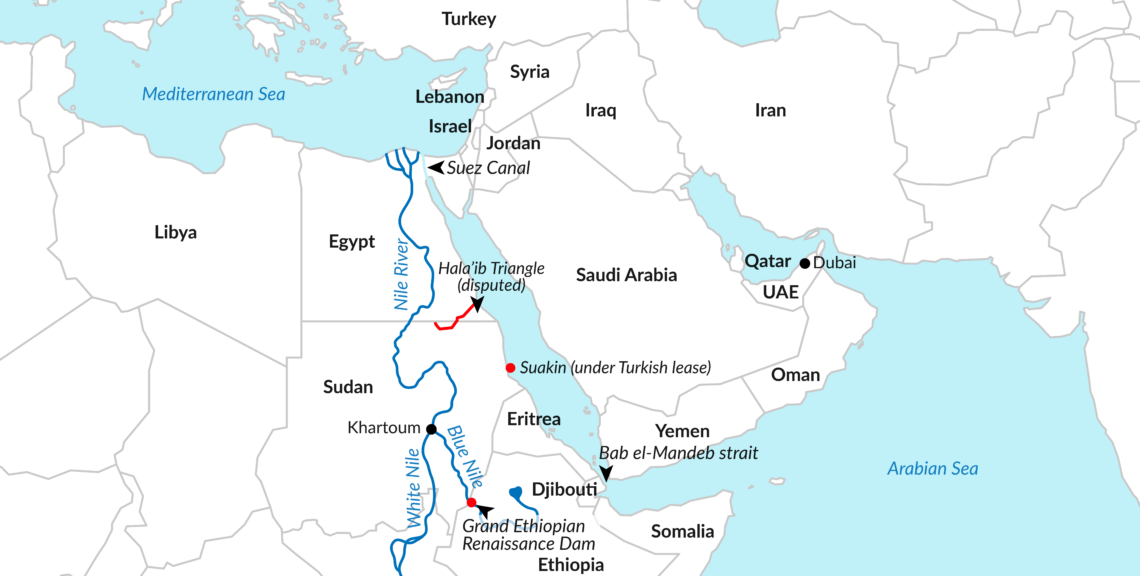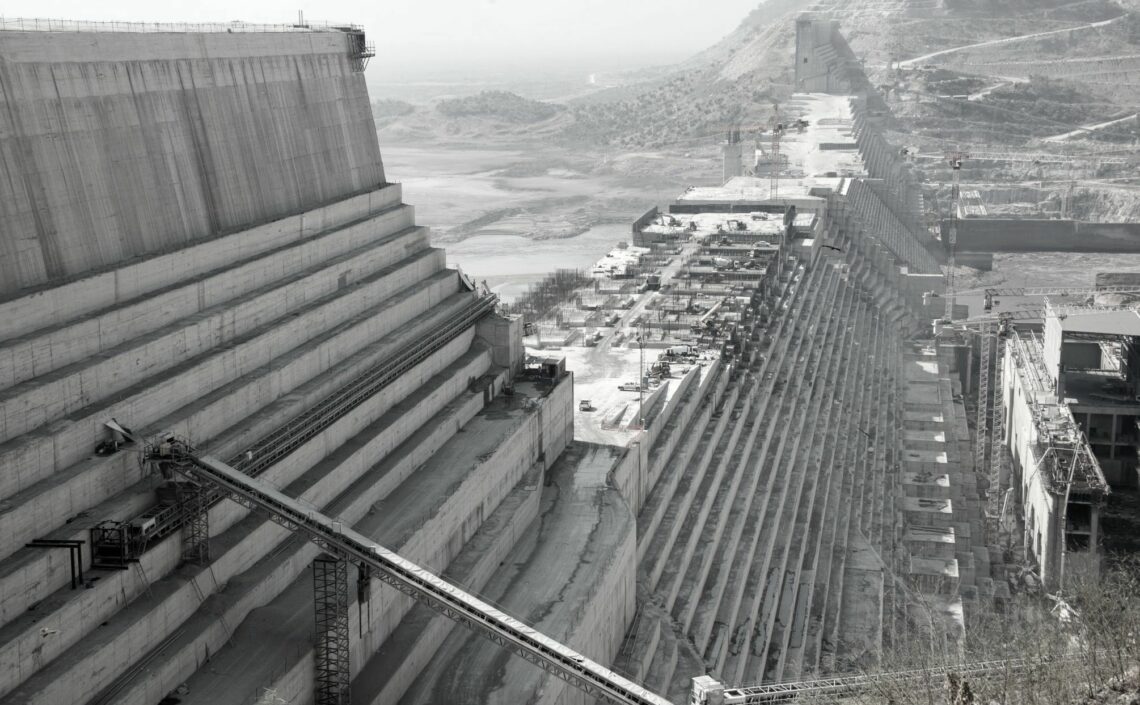Turkey changing the dynamics in the Horn of Africa
Late last year, Turkey secured the lease of an island on Sudan’s Red Sea coast. The location of this ancient port – situated on one of the world’s most important trade arteries – will put Ankara in a position to exercise much greater influence from the Nile to the Persian Gulf.

In a nutshell
- The lease of Suakin gives Turkey a big strategic advantage in the Horn of Africa
- The success is the result of Ankara’s big-picture strategy for the region
- This broad view seems absent in Turkey’s actions in its immediate vicinity
- Which policy approach prevails will determine Turkey’s geopolitical position
When Turkish President Recep Tayyip Erdogan visited Sudan at the end of last year, his country was granted the lease of a strategic Red Sea island, Suakin, off the coast of Sudan close to the Egyptian border. President Erdogan’s mastery of the 400-year history of Ottoman rule in the region has revealed itself again: Suakin was the center from which the Ottomans governed a very wide territory and was the seat of provincial governors and military commanders. Turkey plans to build maritime logistics and tourism facilities there. Many suspect it plans to construct a military base there as well; Ankara has officially denied having such intentions.
The island is roughly at the midpoint between the Suez Canal to the north and the Bab el-Mandeb strait to the south, making it a strategic location in the military, economic and geopolitical senses of the word. It is situated along the great maritime trading highway running from the two China seas, through the Bay of Bengal and the Red Sea, and onward to the Mediterranean and Atlantic ports of Europe.
By securing the island’s lease, Turkey has scored multiple geopolitical wins. Sudan is a key military participant in the Yemeni war on the side of Saudi Arabia and the United Arab Emirates. Now, Turkey has managed to peel Sudan away from the Saudi-led alliance and has begun restoring Khartoum’s previous close ties with Qatar.
Weakened axis
Both Sudan and Qatar are supporters of the Muslim Brotherhood, and Sudanese President Umar al-Bashir has ruled on an Islamist platform that is very close to that of the Brotherhood. Qatar, moreover, played a key role during the Second Sudanese Civil War in reconciling views and devising solutions. Turkey has therefore weakened the Saudi-led axis against Qatar and the Muslim Brotherhood.
By securing the island’s lease, Turkey has scored multiple geopolitical wins.
Moreover, with thousands of heavily equipped Turkish troops stationed in Qatar, on Saudi Arabia’s eastern border, this new presence on the kindom’s western flank sends a clear threat at a time when it is trying to break Iranian encirclement to its south in Yemen and to its north in Iraq and Syria.
Turkey’s future presence on Suakin, so close to Egypt, sends a similar message to Cairo, which has been at loggerheads with Ankara over the latter’s support for the deposed Muslim Brotherhood regime under former Egyptian President Mohamed Morsi. Turkey is making a statement that it intends to play a regional role that extends well beyond the Levant.
Shipping, borders and water
Turkey’s control of the island also means that it could have a significant impact on shipping in the Red Sea. This has several consequences:
1. Turkey is now able to influence, to an unknown degree, traffic flow through the Suez Canal. That could give it leverage over Egypt’s economy, political discourse and foreign policy choices. Turkey will become a de facto neighbor of Egypt.
2. Any logistics facilities Turkey builds on Suakin could lure some of the traffic on the great maritime highway away from those in Dubai for sheer convenience, along with time and cost savings. Using ports in the Gulf requires ships to divert from the Arabian Sea and then back again. Suakin is directly on their path.
3. Turkey’s Gulf adversaries may suffer an adverse economic impact. It has been reported that the United Arab Emirates and, to a lesser degree, other Gulf investors have bought vast tracts of land along the Suez Canal to develop logistics facilities. These may now be rendered significantly less viable, since ships may choose Suakin as their first option. This trend was signaled by Djibouti’s decision to terminate a 50-year concession it gave Dubai to operate its port container terminal.
By aligning itself with Turkey, Sudan’s hand may also be strengthened in its protracted border dispute with Egypt over the Hala’ib Triangle. This territorial dispute stems from the breakup of the Kingdom of Egypt and Sudan, which was originally created under the descendants of Mohammed Ali Pasha and the auspices of Britain by unifying both countries under the Egyptian crown. Turkey’s support for Sudan and its ideologically friendly Muslim Brotherhood-allied regime will weaken Egypt’s position.

Turkey will also likely support Sudan in the trilateral negotiations with Egypt and Ethiopia over each country’s share of water from the Blue Nile, further weakening Egypt’s bargaining position and indirectly bolstering Ethiopia’s. The Blue Nile river passes through Sudan on its way to Egypt from Ethiopia, which has completed 60 percent of its Grand Ethiopian Renaissance Dam. When finished, the dam will be the seventh-largest hydroelectric power plant in the world.
As things stand, Sudan will receive more water from the project, and Egypt less. While this has alarmed Cairo, military action has all but disappeared as an option, and Turkey’s presence at Suakin will be the final nail in the coffin. Egypt’s room for diplomatic maneuver is shrinking as the dam nears completion, while the Central African countries near the Nile’s headwaters support the project. The Turkish presence on Suakin has therefore influenced a key African geopolitical conflict over water.
This tension between broad vision and narrow focus is unsustainable strategically.
The Nile dispute is also a European problem, as any serious water shortages in Egypt will encourage mass migration, particularly into Cyprus. The latter is the European Union’s easternmost territory, situated only 500 kilometers north of Egypt’s Mediterranean coast. Europe must engage as a matter of urgent self-interest with the African players to contain this potential conflict. Turkish-European relations are likely to be influenced by this emerging crisis.
Tensions with the U.S.
Turkey’s seemingly impossible challenge is to reconcile this ambitious bid for geopolitical influence, spanning several spheres of activity and the entire Middle East, with its almost obsessively narrow focus on an issue very close to home – the Kurdish situation.
As Turkey shapes geopolitics in its historic African sphere of influence, key strategic relationships with the United States, NATO and the EU are being tested by the Turkish army’s offensive against the U.S.-supported Kurdish forces (YPG) in their semiautonomous enclave in northern Syria. This Lebanon-sized region is home to 2,000 or so U.S. troops and military advisors in Syria, and Secretary of State Rex Tillerson recently declared that they are staying for the long haul. This raises the possibility of a U.S.-Turkey clash.
This tension between broad vision and narrow focus (which may at times overlap) is unsustainable strategically. How Turkey resolves this problem (or not) will define its geopolitical position and influence. That includes the long-term impact of its presence on Suakin, which has enormous potential for influence in Turkey’s former African dominions.






